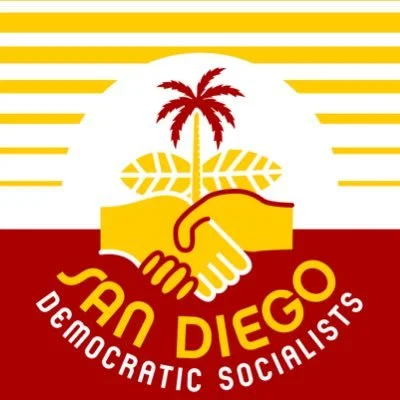

Ithaca DSA Condemns Cornell University’s Authoritarian Crackdown on Student Activists
October 21, 2024
Cornell University targeting anti-genocide protestors with suspension, as well as the threat of expulsion and deportation
Ithaca, NY — On October 17th, four Cornell students, including the former Co-Chair of Cornell YDSA and the President of Cornell Jewish Voices For Peace were suddenly notified of their suspension from the university for participating in anti-genocide protests on campus before promptly being arrested by Cornell University Police and taken away in handcuffs.
"Cornell's recent suspension of four students for their involvement with a protest was a harsh, unaccountable, and repressive act of administrative violence," said DSA-endorsed Tompkins County Legislator Veronica Pillar. "Rather than protecting students, Cornell's actions further endanger the community. I urge Cornell administrators to reverse their decision, and I stand in solidarity with the multitude of students, faculty, staff, and alumni calling for due process, human rights, and an end to investments in genocide. Free Palestine."
"Cornell University claims to uphold values like free inquiry, expression, and community, yet its retaliatory actions against these students—suspending, arresting, and banning them for participating in a peaceful protest—directly contradict these principles," said DSA-endorsed Alderperson Kayla Matos of the Ithaca Common Council. "Cornell can practice these principles by reversing these suspensions and respecting students' right to free speech and assembly.
This comes after Cornell's suspension of Graduate Student Momodou Taal, who the university had threatened with deportation before public backlash caused his suspension to be walked back. After Taal's initial suspension, Joel Malina, Cornell's VP of University Relations, in a private meeting with students and parents, affirmed that Cornell University is comfortable with inviting the Ku Klux Klan to university campus. Cornell University's willingness to deport a Black immigrant student for exercising his right to free speech while simultaneously welcoming white supremacists onto campus is blatant white supremacy and we condemn it unequivocally.
“As of late Cornell University appears more concerned with surveilling and policing its students than with educating them,” said Jorge DeFendini, Chair of Ithaca DSA. "I urge the university to adhere to its mission of 'Any Person, Any Study,' and allow all students to exercise their right to free speech without vindictive retaliation from the administration."
Ithaca DSA condemns Cornell University's retaliation against its students and stands in total solidarity with these brave protestors in their principled stance against the genocide of Palestine. We call on the university to reverse these suspensions, drop arrest charges, and adhere to the student body's resounding call to divest from companies complicit in Israel's genocide in Gaza.
Solidarity Forever & Free Palestine.
Steering Committee of Ithaca Democratic Socialists of America


Ithaca DSA Stands with UAW 4811 in ULP Strike Against Violent Repression
May 29, 2024
Over 48,000 members of UAW 4811, higher ed workers in the University of California system, are standing up and striking back against unfair and illegal repression by their universities. These workers make the university system run with their labor, by instructing classes and bringing in grant money with their research. The wealth they create is then invested in weapons manufacturers and other companies that supply, support, and enable the genocide in Gaza, the illegal settlement of the West Bank, and the day to day violence of Israel’s apartheid regime. This Monday, May 19, they began their strike.
These workers heeded the call put out by their fellow students, joining the movement for a ceasefire in Gaza and Palestinian liberation. Union members were tear-gassed, beaten, and intimidated – first by counter protesters and then by police called by the University of California.
The response to students and workers exercising their right to free speech was repression and violence. But these academic workers are unionized, and have legal protections from unfair labor practices like this. And they have a tool to protect their rights: the strike.
With this strike, UAW 4811 makes the following demands:
1. Amnesty for all academic employees, students, student groups, faculty, and staff who face disciplinary action or arrest due to protest.
2. Right to free speech and political expression on campus.
3. Divestment from UC’s known investments in weapons manufacturers, military contractors, and companies profiting from Israel’s war on Gaza.
4. Disclosure of all funding sources and investments, including contracts, grants, gifts, and investments, through a publicly available, publicly accessible, and up-to-date database.
5. Empower researchers to opt out from funding sources tied to the military or oppression of Palestinians. The UC must provide centralized transitional funding to workers whose funding is tied to the military or foundations that support Palestinian oppression.
UC academic workers are fighting against repression on behalf of students and workers everywhere, from California to Palestine! Their fight is our fight, and we stand with them!
As DSA members, we know that the workers at the University of California are fighting not just for their own safety and right to peacefully protest, but for workers all across the world, especially in Palestine. Workers at UC are taking a bold step, striking not only for better working conditions, but to defend their fundamental political rights and freedoms. After all, it is our collective power to withhold our labor by which these very rights are guaranteed. We know that the struggle for a better future begins on the shop floor, and as democratic socialists, we stand loudly and proudly alongside all workers who demand political freedom and an end to the genocide in Palestine.
Therefore, as Ithaca DSA members we commit to:
Amplify the demands of the rank-and-file through public statements of support
Hold UC accountable to meet the just demands of their workers
(IF APPLICABLE: We will join striking workers on the picket line and provide material support to help them stay strong)
When workers, students, and social movements stand together demanding an end to US complicity in Israel’s genocide, we will win!


Support for Professor Russell Rickford
First Published October 29, 2023
Ithaca DSA supports Professor Russell Rickford and is disgusted by the attacks being leveled at him. He has been accused by Cornell campus groups and media outlets of celebrating Hamas’s violence against Israeli civilians and promoting hate speech. These accusations are based on a short and decontextualized video clip of a much longer, 19-minute speech that was given at a rally in support of the Palestinian people, co-organized by Jewish Voices for Peace and the Ithaca Committee for Justice for Palestine and co-sponsored by the Ithaca DSA and other local organizations. Professor Rickford did NOT support or glorify violence against civilians. In fact, he stated "I hate violence. I hate violence. I can’t stand guns. I come from a deep tradition of peace. I come from a deep tradition of resistance to militarism, and to war. I would never presume, on principle, I would never presume, to tell an oppressed people how they should seek their liberation... I abhor the killing of civilians. It’s horrific," (full transcript of speech here).
The deliberate misrepresentation and decontextualization of his speech is an affront to open dialogue and free speech, which Cornell purports is a key value of the university. We call on Cornell to take the side of Professor Rickford, instead of those making bad faith attacks, undermine free speech, and distort others’ viewpoints for political gain.
Professor Rickford is a wonderful scholar, teacher, community member, and activist who does not deserve this incredible outpouring of hate and disinformation.


Peninsula DSA Statement on the 2024 US Presidential Election
The question is the same as it was a hundred years ago: Will we collectively choose Socialism or Barbarism?
Democratic socialists know that governments that protect the interests of the ruling class while refusing to guarantee our rights to housing, healthcare, and education are democracies only in name, and that both major parties in fact support a dictatorship of the bourgeoisie (that is, the one percent). Even so, DSA engages with the electoral process as candidates, campaigners, canvassers, and voters. The electoral arena is often where we find allies, grow coalitions, and inspire the rest of the working class to build socialism together, brick by brick.
This election, we are faced with a stark reality that the duopoly power shared by the two major US parties is a ratchet effect, dragging the window of political discourse ever rightward, despite the broad popularity of progressive policy. As socialists, we understand the Purpose of a System is What It Does, and in an election in which progressive policies and down-ballot candidates consistently outperformed the top of the ticket, it is clear that the Democratic Party is more concerned with excising social democratic and “Berniecrat” elements from the party and providing unwavering material support for Israeli genocide than winning “the most important election of our lifetimes.” To be clear, the Democratic corporate consultant class will get paid either way, and the stock portfolios of Democratic and Republican politicians alike will continue to go up.
The bourgeois election process may have selected the American version of fascism embodied in Donald Trump, but we recognize two important facts. One, American fascism is neither recent nor novel, with a long, brutal history both domestically and internationally supported by both parties. Two, as proven in places like Indonesia and Chile, democratic socialist policies are broadly popular and effective at countering reactionary politics, at least until the forces of US capital intervene on the side of violent, anti-democratic repression. As Americans worry about the very real threat of violent, anti-democratic repression at home (an ongoing and longstanding reality for many Americans, and a new possibility for certain privileged groups), it is worth reminding ourselves that the tools of imperial control perfected abroad will inevitably come home and be used on us too.
What Is to Be Done?
The question is the same as it was a hundred years ago: Will we collectively choose Socialism or Barbarism? American support of Israel’s brutal genocide and ethnic cleansing in Gaza, mirrored by the brutal militarization at our southern border, shows that the American ruling elite have made their choice: barbarism. Therefore, we must organize together to build a future worth passing on to the next generation. We must be sober, analytical, and adaptable. We must look to the analysis and lessons learned from those that came before us. We must help educate each other.
We are in the midst of a multi-generational class war, as well as a time of many morbid symptoms as the old world dies and the new world struggles to be born. What that new world will look like remains to be seen, but in the words of the late, great David Graeber, “The ultimate hidden truth of the world is that it is something we make, and could just as easily make differently.”


Statement from the Leadership Council following the 2024 general election
In the wake of the 2024 general election, many of us are feeling despair, grief, and anger over the results, especially at the national level. We had terrible options—between a wannabe fascist dictator and a neoliberal genocidaire in the Oval Office, neither outcome would be desirable for the working class in the United States. Unfortunately, [...]
Read More... from Statement from the Leadership Council following the 2024 general election
The post Statement from the Leadership Council following the 2024 general election appeared first on Democratic Socialists of America | San Diego Chapter.


San Antonio DSA Stands Against Fascism and the Donald Trump Presidency
by San Antonio DSA
San Antonio, TX — The Democratic Party, by backing a genocide in Palestine and failing to inspire working-class people with a transformative agenda, has handed a winnable election to Donald Trump for the second time, empowering a growing racist, authoritarian, right-wing movement. Moving beyond the limitations of the two-party system and advancing the interests of working-class people will require sustained organizing that extends far beyond a single election.
We—the working class—now face a monumental challenge. In the 2025 Trump administration, we can expect truly disastrous attacks on democracy and free expression, labor unions and worker protections, refugees and immigration, public education, LGBTQ+ protections and dignity, economic justice, Palestinian liberation, mass incarceration, housing, healthcare and bodily autonomy, and the environment—to name a few.
Now, more than ever, is the time to lock in & get organized.
In the San Antonio DSA, we:
Help workers win new unions through our San Antonio Workplace Organizing Committee @satxorganizeworkers
Strengthen existing unions through the analysis & organizing of SA-DSA union members
Develop our communities into forces that can win campaigns to provide for our needs, through our Houseless Mutual Aid work in @sacollectivecare and our support for other grassroots community organizing
Help elect democratic socialists—we endorse and win elections on the San Antonio City Council and the School Board
Our task is to grow this work into a mass movement big enough to win the world we deserve.
In the San Antonio DSA, we don’t just want to say the right words. Rather, we are dedicated to building each other up into effective organizers, and committing ourselves to long-haul organizing projects.
That is what it takes for the working class to win. There has never been another way.
Join us! DSAUSA.org/join
On the 2024 US national election
The results of the election are frightening and difficult to process.
DSA knows that Donald Trump and the Republican Party will be a terror on the working class while they remain in power. This terror will disproportionately impact already vulnerable communities, including people who are Black, indigenous, Hispanic, queer, immigrants, and more, as it did during the prior Trump term. The return of “Muslim bans”, gutting of carbon initiatives, an even more unabashedly reactionary Supreme Court, an unrepentantly hostile NLRB, an emboldened rightist paramilitary movement both in and out of the state — all these and more are in the offing. The Israeli settler state is celebrating, brazenly announcing its intention to permanently depopulate Northern Gaza of its already starved and shell-shocked residents. Project 2025, or some other iteration of right-wing state consolidation, may yet find its day in the sun, having shed some of the aura of liability.
Meanwhile, the current leadership of the Democratic Party has failed to produce a convincing alternative to the rise of fascism and plays into the right-wing agenda in critical and unacceptable ways. While the various causes that led to Kamala Harris’ defeat will be teased out in the weeks to come, we already know that the policy that “nothing will fundamentally change” of Biden and Harris has alienated the multiracial US working class, who do not see the Democratic Party as sufficiently fighting for their needs.
We know the US political system, irrespective of its official labels, ultimately serves capitalism, settler colonialism, imperialism, white supremacy, and cis-heteropatriarchy. These imperatives lock it into a death spiral that threatens the whole of human existence. The rate of spiral may ebb and flow under the hand of different nominal masters, but the direction remains the same — as long as these forms of domination exist unchallenged.
Many of us are disheartened. We are making space to mourn collectively, while recognizing our individual forms of heartbreak. We own the failures of the US Left to credibly point a way out of our deepening polycrisis, outside of its usual circles. We also know that, per Black abolitionist organizer and academic Mariame Kaba, “hope is a discipline.” Even when the future is uncertain or dangerous, we have the responsibility to believe that we will win. We will win a world where democracy flourishes, people’s basic needs are met, and working class people have the power.
We will only win when we are organized. And we will be organized only when working people striving for a better world can genuinely find a voice in Left political life.
Regardless of the election results, our task is to organize — to become a bigger and more skilled socialist movement, to contest for power, and win big for the working class.
The DSA 2024 Workers Deserve More platform is part of the path in which we can do that. Find out more here: https://2024.dsausa.org/
If you have never organized before, or if you have had to step away, we invite you to join Silicon Valley DSA or peer organizations fighting to make Silicon Valley a place where all working people can thrive.
At our upcoming chapter meeting on November 16 at 1pm we will talk about this as a community. Please join us, and let’s cry, laugh, argue, strategize, despair, celebrate, and above all struggle together – for the better world that can and must be.
In unity,
SVDSA Officers
The post On the 2024 US national election appeared first on Silicon Valley DSA.


Houston DSA is ready to continue the fight
The fight against Trump and the Republican Party’s renewed assault on working, marginalized, and oppressed people continues. The right wing agenda laid out in Project 2025 and supported by Trump […]
The post Houston DSA is ready to continue the fight appeared first on Houston DSA.


[Media Advisory] Local Raleigh Organizations Hold Organizing Fair
Media Advisory
For Immediate Release
November 6th, 2024
Politics Beyond the Ballot Box
Local Raleigh Organizations Hold Organizing Fair
Moore Square, Raleigh, NC
November 9th, 2024 1-4PM
NC Triangle Democratic Socialists of America, in collaboration with multiple local organizations dedicated to social justice, organized labor, and community support, will be hosting a public Organizing Fair in Moore Square in Raleigh on November 9th from 1-4pm. This will be an opportunity for community members to learn about the struggles in their area and the organizations involved in this vital work. With the end of the 2024 election, more Americans than before are paying attention to politics. But, we need to recognize that voting is only one of the essential ways we express our voices and advocate for our communities. Labor protections, civil rights, and peace cannot be advanced once every four years. They must be fought for every day, week, month, and year.
This organizing fair will be a place for passionate Triangle residents to become connected to these fights in their own backyard. The event will have tabling to create opportunities connecting community members with organizers, speeches from veteran organizers about next steps, and tables for community members to discuss the 2024 election and its consequences. Organizations participating include but are not limited to: Raleigh Mutual Aid Hub, The Southern Workers Assembly, Jewish Voices for Peace, Triangle Tenants Union, Meals for the Masses, Palestinian Youth Movement, and the NC Triangle Democratic Socialists of America.
“The strategy of showing up every few years to cast a vote clearly is insufficient. Workers are kept out of power no matter who is in charge. It does not need to be that way though- workers are really what makes everything run. Nothing is made without labor. We have power, we just have to be organized and conscious. This event is important because it is a first step towards realizing the power we can only claim if we get organized.” - Jody, IBEW member
We encourage all Triangle residents who care about this election to turn out and learn about how they can become involved in their community’s work. We cannot trust elected officials themselves to fix the growing problems our nation is experiencing. We have to do it ourselves. And there is no other place to get started like your own community.


An Organizational Chimera: Challenges and Opportunities for a Growing DSA

By Adam S
DSA is an organizational chimera–– a delightful and dazzling yet fragile and baffling assemblage of different pieces all in one–– and I think we should talk about it.
Allow me to explain.
Socialists have historically been divided between those who believe socialism can be guided along, or even instituted, by governments, and those who believe socialism must be built by working class organizations made up of working class people. In the nineteenth century, these hostilities were on full display in the rifts that broke out between social democratic parties who sought a parliamentary road to socialism through a combination of legislation and trade union activities and anarchist-oriented syndicalists who thought that, "by organizing industrially," they could form "the structure of the new society within the shell of the old," to quote the Industrial Workers of the World.
Democratic Socialists of America does not fit neatly into either of these camps. On the one hand, we are not a syndicalist organization, and much of our membership is not directly based in the trade union movement. But neither are we a political party, though we do endorse candidates and intervene in elections. Instead, we operate on many political fronts simultaneously –– we are a union incubator, a civil rights group, and an electoral machine all at once. In this way we are an organizational chimera: multiple different pieces all assembled into one collective, rapidly growing, rapidly changing body.
This also causes DSA to function as a social network for the Left. Those who recognize the need for a change in our economic system join DSA at a higher rate than than any other socialist organization in the United States, learn about and connect with similarly minded people, and, in the best cases, engage in the hard work of organizing for a better world. This has the benefit of imbuing our work with a coherent alternative to neoliberal or reactionary thinking and is an invaluable means of identifying the social origin of many ills that affect modern life under the capitalist system. It is also the primary aspect that unifies the disparate pieces that make up DSA.
However, DSA’s function as a social network means that socialists are often connected to campaigns through DSA, rather than in or by DSA. This causes problems with retaining focus on DSA’s organizational core, and in the long run this jeopardizes the substantial gains that DSA has made in membership and influence since 2016.
Members joining an organization who end up working for other organizations do not easily retain their original, rather than inherited, responsibilities. This is just a description, not an attack on the good work that is being done: yours truly is certainly guilty of this to a certain extent. But it means that some appendages to DSA take on an importance that can be substantially different from work that builds DSA.
This conundrum has affected the work of some working groups within DSA, including the Labor Working Group. The Labor Working Group has provided support to an array of efforts in the Triangle area and beyond, including supporting CWA workers on strike, supporting REI workers organizing to unionize and gain recognition, providing a forum for grad students at UNC and Duke to connect with fellow socialists, and providing extensive support to the Carolina Amazonians United for Solidarity and Empowerment, or CAUSE, perhaps the single most exciting and dynamic grassroots Amazon union in the entire country.
At the same time, the Labor Working Group has struggled to retain membership to develop its core competencies, leaving its main leaders under-supported and over-worked on internal DSA matters even as their members plug in and rapidly spin off to provide consistent support to external campaigns.
To provide one concrete example of how these contradictions harm DSA’s ability to do even its most important work, at the very same time that CAUSE began collecting cards to take their campaign to the next level, the key members of the Labor Working Group, which has had a priority resolution in force providing invaluable support to workers on that campaign for almost a year, had so little support that they were considering dissolving. Even now, its future remains uncertain, and even if the work is reshaped in new ways, the conflicts between internal growth and external organizing will likely remain. Again, the problem here is not with those who took on leadership responsibilities within the working group, but that so few did.
So what is the path forward? How can we make this chimera into something more elegant? A few solutions have been offered. Some have suggested that the working group model is out of date and that encouraging people to meet regularly on general thematic topics like “labor,” “socialist feminism,” or “ecosocialism” rather than specific campaigns risks burning people out. There is some truth to the idea that committees should be task-oriented. Yet at the same time, that diagnosis does not address the wider problem of DSA being a “forum through” rather than a “hub of” organizing. Saying our dear chimera should have functional pieces does not itself knit it into a more unified body.
Others have suggested that members should be doing more as workers, organizing directly in their own workplaces and communities around specific ways to build power. This suggestion is especially relevant for contexts like union building or tenant organizing where the task is very specific.
Yet not all workers are able to organize in this way, either because they do not have the capacity to organize their tenants or are not employed somewhere that gives the ability to organize. This means that the exhortation of members to organize does not always make sense. Workers join an organization because of what they can do for the organization, not just themselves. Saying our wonderful chimera’s individual pieces should, amoeba-like, have their own organizational ecosystems, is at odds with why it was ever assembled.
What is common to both these approaches is arguably the idea that solving this problem–– making DSA a hub rather than a forum–– will require a change in the relation of DSA members to DSA itself, an alteration in the significance of what members believe they are joining for. It will require that members come to understand that they are joining DSA at least as much for themselves as for other people, and to change their conditions, as the conditions of their fellow workers. It will also require that they understand that DSA does not exist by fiat –– it is only empowered when we do the hard work of strengthening it ourselves.
This entails becoming an organization that conceives of collective solidarity as also a personal act placing each individual’s own experiences alongside those of other members in the movement for socialism, and not as external to, or supportive of, some other movement. The paradox is, seen in this way, arguably that DSA members must see ourselves as members of the socialist movement in the way we live our lives, not as abstract bringers of support to something beyond or above us, not as representatives bringing some exalted sense of “socialism” to fellow workers in our communities, but as individuals bringing the energy of solidarity into all that we do for DSA as well as through it.
The hybridity of DSA can also be a source of strength. By building a community of socialists engaged in struggle across many fronts, we can channel our energies collectively to transform our communities, our unions, and our political systems for the better. We can connect the struggles our members face across different arenas into a single unified movement, and we can live lives that give expression to our goals in many ways rather than pigeonholing ourselves into narrow manifestations of political engagement.
In doing this, DSA can realize the promise it holds of being a way for workers to build collective power with one another and build a new world within the shell of the old, made–– like a chimera–– out of many pieces, the pieces of our daily lives.